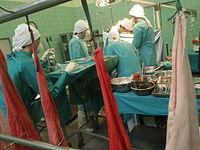
Photo from wikipedia
Supplemental Digital Content is available in the text Introduction Organ transplantation is the last resort for many patients. The ubiquitous shortage of suitable donor organs raises the question of best-justifiable… Click to show full abstract
Supplemental Digital Content is available in the text Introduction Organ transplantation is the last resort for many patients. The ubiquitous shortage of suitable donor organs raises the question of best-justifiable allocation worldwide. This study investigates how physicians would allocate donor organs. Methods Focus group discussions with a total of 12 transplant surgeons and 2 other transplant-related physicians were held at the annual conference of the German Transplantation Society (Oct 2019). Three groups discussed aspects of ‘egalitarianism’, ‘effectiveness/benefit’, ‘medical urgency’, ‘own fault’, ‘medical background’ and ‘socio-demographic status’. Results and Discussion It was observed that physicians often find themselves confronted with conflicts between (a) trying to advocate for their individual patients versus (b) seeing the systemic perspective and understanding the global impact of their decisions at the same time. The groups agreed that due to the current shortage of donor organs in the German allocation system, transplanted patients are often too sick at the point of transplantation and that a better balance between urgency and effectiveness is needed. The aspects of ‘effectiveness’ and ‘urgency’ were identified as the most challenging issues and thus were the main focus of debate. The dilemmas physicians find themselves in become increasingly severe, the larger the shortage of suitable donor organs is.
Journal Title: Current Opinion in Organ Transplantation
Year Published: 2021
Link to full text (if available)
Share on Social Media: Sign Up to like & get
recommendations!